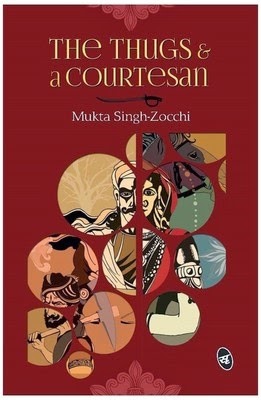The Thugs and a Courtesan: A Review
This relatively short novel is on the life of a thug named
Firangia and his extramarital affair with a Maratha princess named Chanda Bai. Author
Mukta Singh-Zocchi’s narrative style is folklore-type and the story is woven
with a historical background that of the Maratha prime minister, Balaji Baji
Rao II’s exile imposed by the British.
In Chanda Bai, one can see the semblance of a patriotic warrior,
who on the face of a foreign invasion attempts to save her motherland. The folktale-style
narration keeps the story together even though the rituals and events in the
story seem a bit absurd to the fanatics of ‘written’ history. However, with the
background of historical events, The
Thugs and a Courtesan stands out among other Indian writings in English in
our time in its ambition and impact.
Mukta Singh-Zocchi is born in Ithaca, New York and raised in New
Delhi. The Thugs and a Courtesan is
her first novel. The story begins as the narrator Zalim Singh raises the
curtain to a series of curious events, people and locations. Zalim Singh
himself belongs to the clan of thugs, who at a time long ago ruled the wooden
landscapes and lonely trade routes in Northern India. They looted the travelers
and lived on the plunder.
In the novel, however, thugs aren’t mere robbers. The Thugs and a Courtesan is crucial in
terms of how the protagonist is portrayed. He is not the all-good, kind and benevolent
single hero who falls in love with the love of his life. Instead, the protagonist
is a cruel, merciless thug, who does not hesitate to execute his prey in the
name of the goddess Kali, the pagan goddess of violence and death. The Thugs and a Courtesan questions several
norms of morality using its subtle narration and plot. One might read questions
of moral urgency such as ‘why is killing unacceptable?’ and ‘why cannot a man
take more than one woman as wives?’ while reading between the lines as being
asked by the novel.
 |
| Image Courtesy: Google |
Chanda Bai represents the spirit of nationality and also the
quest for power and ambition. Firangia is involved in the mission of his life
that is to put to an unhesitant death whoever he or his gang of thugs come
across. Killing seems to be the only motif the band of thugs is born to
perform. And in the stage of the novel, this motif seems to fit not so
naturally either. The lacking logic behind all the strangling and murders are
explained away as the mindless and immoral commitment to Kali, the death
goddess. In this sense, the apprehension that Mukta Sing-Zocchi’s novel brings
back India from the textbooks of the age-old orientalists, who were dedicated to
prove that India is a land of snake charmers and magicians cannot be dismissed.
For those who are interested in an Indian English fiction with a
folklore touch to its narration, The
Thugs and a Courtesan would be satisfying. Mukta Sing-Zocchi has succeeded
in bringing tension and emotional conflict even through the haze and matrix of
life and times in the pre-independent India. Published by Srishti Publishers and Distributors, The Thugs and a Courtesan
has a beautiful cover art too. Sometimes, covers do speak the truth.








Comments